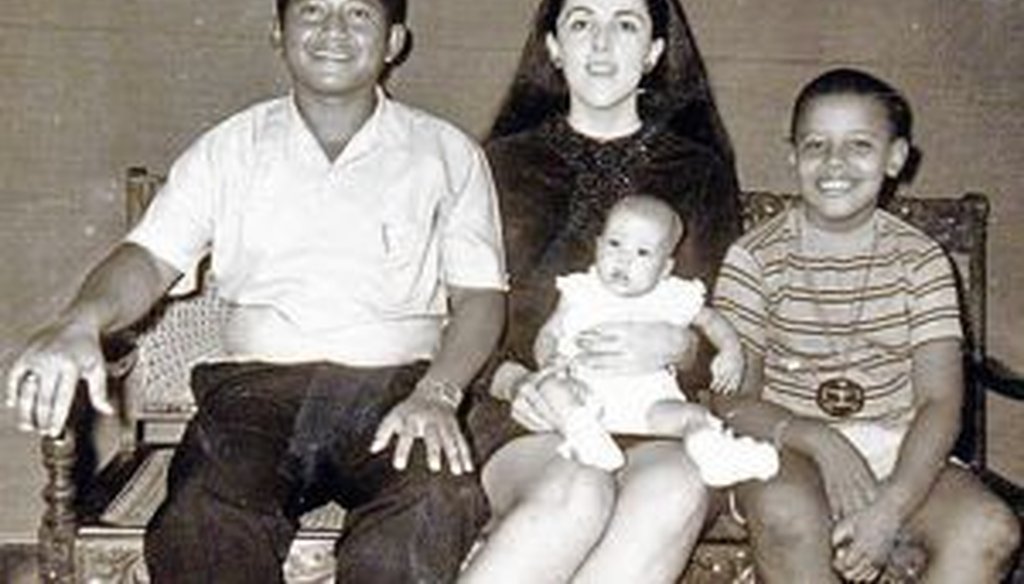Stand up for the facts!
Our only agenda is to publish the truth so you can be an informed participant in democracy.
We need your help.
I would like to contribute

Barack Obama at age 9, shown with his mother Ann Dunham, his Indonesian stepfather Lolo Soetoro, and his less than 1-year-old sister Maya Soetoro in Jakarta, Indonesia.
Supporters of Mitt Romney and Barack Obama have been sparring about dogs. Obama supporters have noted that Romney drove the family car with his dog Seamus attached to the top in a crate. Romney supporters have been saying lately that Obama has acknowledged eating dog when he was a boy in Indonesia. For today's installment of our In Context series, we'll explore what Obama has said.
The account comes from Obama’s autobiography, Dreams from My Father, which includes an account of his interactions with animals shortly after moving to Indonesia. Obama lived there between 1967 and 1971 -- when he was 6 to 10 years old -- during his mother’s marriage to Lolo Soetoro, an Indonesian-born student she had met at the University of Hawaii.
Here's a passage about Obama's arrival in Indonesia:
The house was in a still-developing area on the outskirts of town. The road ran over a narrow bridge that spanned a wide, brown river; as we passed, I could see villagers bathing and washing clothes along the steep banks below. The road then turned from tarmac to gravel to dirt as it wound past small stores and whitewashed bungalows until it finally petered out into the narrow footpaths of the kampong (village). The house itself was modest stucco and red tile, but it was open and airy, with a big mango tree in the small courtyard in front. As we passed through the gate, Lolo announced that he had a surprise for me; but before he could explain we heard a deafening howl from high up in the tree. My mother and I jumped up with a start and saw a big, hairy creature with a small, flat head and long, menacing arms drop onto a low branch.
"A monkey!" I shouted.
"An ape," my mother corrected.
Lolo drew a peanut from his pocket and handed it to the animal’s grasping fingers. "His name is Tata," he said. "I brought him all the way from New Guinea for you."
I started to step forward to get a closer look, but Tata threatened to lunge, his dark-ringed eyes fierce and suspicious. I decided to stay where I was.
"Don’t worry," Lolo said, handing Tata another peanut. "He’s on a leash. Come, there’s more."
I looked up at my mother, and she gave me a tentative smile. In the backyard, we found what seemed like a small zoo: chickens and ducks running every which way, a big yellow dog with a baleful howl, two birds of paradise, a white cockatoo, and finally two baby crocodiles, half submerged in a fenced-off pond near the edge of the compound. Lolo stared down at the reptiles. "There were three," he said, "but the biggest one crawled out through a hole in the fence. Slipped into somebody’s rice field and ate one of the man’s ducks. We had to hunt it by torchlight."
There wasn’t much light left, but we took a short walk down the mud path into the village. Groups of giggling neighborhood children waved from their compounds, and a few barefoot old men came up to shake our hands. We stopped at the common, where one of Lolo’s men was grazing a few goats, and a small boy came up beside me holding a dragonfly that hovered at the end of a string. When we returned to the house, the man who carried our luggage was standing in the backyard with a rust-colored hen tucked under his arm and a long knife in his right hand. He said something to Lolo, who nodded and called over to my mother and me. My mother told me to wait where I was and sent Lolo and questioning glance.
"Don’t you think he’s a little young?"
Lolo shrugged and looked down at me. "The boy should know where his dinner is coming from. What do you think, Barry?" I looked at my mother, then turned back to face the man holding the chicken. Lolo nodded again, and I watched the man set the bird down, pinning it gently under one knee and pulling its neck out across a narrow gutter. For a moment the bird struggled, beating his wings hard against the ground, a few feathers dancing up with the wind. Then it grew completely still. The man pulled the blade across the bird’s neck in a single smooth motion. Blood shot out in a long, crimson ribbon. The man stood up, holding the bird far away from his body, and suddenly tossed it high into the air. It landed with a thud, then struggled to its feet, its head lolling grotesquely against its side, its legs pumping wildly in a wide, wobbly circle. I watched as the circle grew smaller, the blood trickling down to a gurgle, until finally the bird collapsed, lifeless on the grass.
Lolo rubbed his hand across my head and told me and my mother to go wash up before dinner. The three of us ate quietly under a dim yellow bulb--chicken stew and rice, and then a dessert of a red, hairy-skinned fruit so sweet at the center that only a stomachache could make me stop. Later, lying alone beneath a mosquito net canopy, I listened to the crickets chirp under the moonlight and remembered that last twitch of life that I’d witnessed a few hours before. I could barely believe my good fortune.
Here's Obama's account of the foods they ate:
It had taken me less than six months to learn Indonesia’s language, its customs, and its legends. I had survived chicken pox, measles and the sting of my teachers’ bamboo switches. The children of farmers, servants and low-level bureaucrats had become my best friends, and together we ran the streets morning and night, hustling odd jobs, catching crickets, battling swift kites with razor-sharp lines -- the loser watched his kite soar off with the wind, and knew that somewhere other children had formed a long, wobbly train, their heads toward the sky, waiting for their prize to land. With Lolo, I learned how to eat small green chili peppers raw with dinner (plenty of rice), and, away from the dinner table, I was introduced to dog meat (tough), snake meat (tougher), and roasted grasshopper (crunchy). Like many Indonesians, Lolo followed a brand of Islam that could make room for the more ancient animist and Hindu faiths. He explained that a man took on the powers of whatever he ate: One day soon, he promised, he would bring home a piece of tiger meat for us to share. That’s how things were, one long adventure, the bounty of a young boy’s life. ...
Sign up for PolitiFact texts
So it was to Lolo that I turned for guidance and instruction. He didn’t talk much, but he was easy to be with. With his family and friends he introduced me as his son, but he never pressed things beyond matter-of-fact advice or pretended that our relationship was more than it was. I appreciated this distance; it implied a manly trust. And his knowledge of the world seemed inexhaustible. Not just how to change a flat tire or open in chess. He knew more elusive things, ways of managing the emotions I felt, ways to explain fate’s constant mysteries.
Our Sources
Barack Obama, Dreams from My Father, 1995.




















































